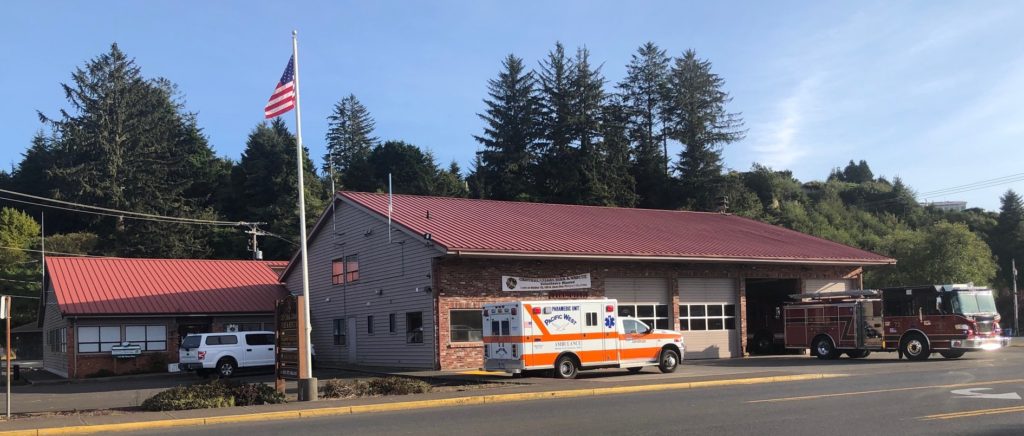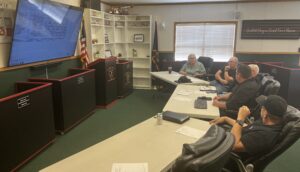
By QUINTON SMITH/YachatsNews
WALDPORT – The Central Oregon Coast Fire & Rescue District board voted unanimously Thursday to ask voters in November to increase their property taxes to help make up for inflation, increased operating costs and to rebuild the district’s financial reserves.
The board approved asking for a 60 cent increase to an operations levy of $1.27 that has been the same since it was approved eight years ago. The request follows a June budget process where the board authorized seeking a $300,000 loan for when it expects to run short of operations money between August and November, when property taxes begin arriving.
The current operations levy of $1.27 per $1,000 assessed property value costs a taxpayer $317 a year on property assessed at $250,000. If approved in November, the 60 cent increase would add $150 a year onto that bill starting in 2026.

The fire district also has a permanent tax rate of 82 cents per $1,000 assessed property value and a second, small operations levy of 35 cents per $1,000 that voters increased by 10 cents in 2022. Combined, those two levies cost the owner of property assessed at $250,000 just over $292 a year.
Combined, the tax base and two current levies cost the owner of property assessed at $250,000 about $610 a year for fire and medical emergency services.
For years the district had a healthy cash carryover from the end of the fiscal year in June to tide it through the summer until property taxes arrived in November. But fully staffing the district with six firefighters and rapid increases in the cost of everything from supplies to insurance to salaries has changed that.
“We are essentially eating up our rollover funds because we didn’t ask for a levy increase during the Covid pandemic,” Chief Jamie Mason told the board during a workshop meeting Tuesday.
During its regular monthly meeting Thursday, the board agreed and voted 4-0 to send the 60 cent increase request to the Nov. 5 ballot. Board member Zach Akin, a former Lincoln County Sheriff’s deputy, is now working in Redmond and did not attend the meeting.
The district expects to collect $1.12 million in property taxes this fiscal year, Mason told the board, and after other income will have $1.4 million for operations. But he projected personnel costs – the district has nine employees – to be $945,000.
“People cost the most money, especially people with full benefits,” Mason told the board.
He said with a larger operations levy, the district will not have to borrow money during the summer to tide it over, but instead account for rising costs, rebuild its cash carryover and again start putting money away for capital projects like station repairs and replacing equipment.
District firefighters respond to 1,000 to 1,200 calls a year, ranging from fires and medical emergencies, to vehicle rashes and water rescues. The district also has mutual aid agreements with fire departments in Yachats, Seal Rock, Alsea and Newport.
Station needs
Mason and the current and previous boards have also been trying to find ways to upgrade the main station in downtown Waldport, which needs a new roof, some siding, engine bay doors and floors, and extensive remodels to firefighter and ambulance staff quarters.
The board had been considering asking voters for a bond – anywhere from $5 million to $14 million depending on the work – but has struggled to find support and grants for that expensive a project.
Board member Jon MacCulloch asked Tuesday how seeking a larger levy would affect the idea of a station bond of 80 cents per $1,000 assessed property value.
Mason said if voters approve the levy, then a bond is likely a “no” and the district would rely on state or federal funds and grants for any repairs and remodeling. Rep. Val Hoyle, D-Ore., has a request in to the House Appropriations Committee for $1 million to help with station improvements.



I will be voting no. I’m sorry but as a disabled senior living on a fixed income I can not afford it. I would like to keep my home.
If you have a $250,000 home it’s an extra $150 a year. If you have a $500,000 home, it’s an extra $300 a year. Are you really being honest and saying you cannot afford that? Don’t you think protecting your home from fire is worth that?
Remember this is based on the county assessed value, not market value. My assessed value is 230k which is less than half the current market value. My tax increase will be approximately $12 monthly. For what we get in services I will gladly pay that. Remember the fire district has not asked for an increase on this for 10 years.